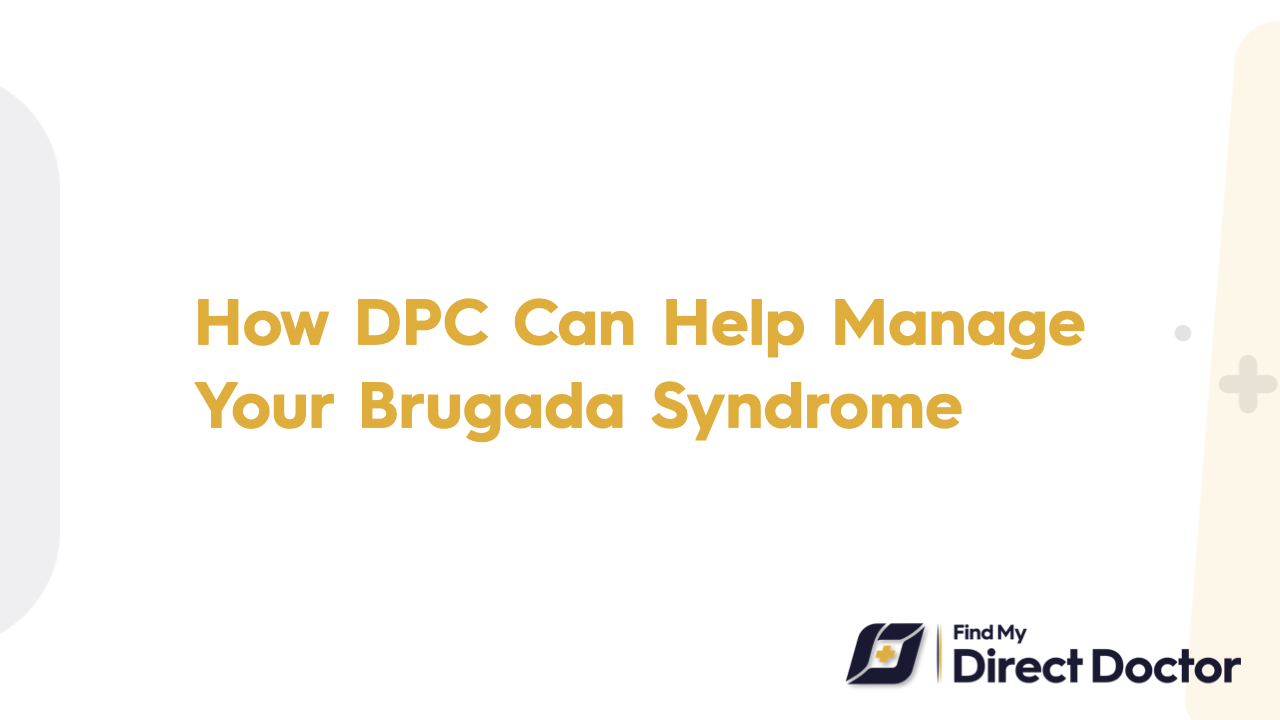



Imagine being told you have a serious heart disease that runs in your family and could kill you without warning, even if you feel fine. People with Brugada Syndrome live in this reality. The diagnosis makes people very anxious and makes them wonder how to stay safe. To get through this, you need medical care that is very attentive and quick to respond. Direct Primary Care (DPC) is great at this because it takes a proactive and personalized approach to managing this hidden risk, which gives patients and their families peace of mind.
Brugada Syndrome is a genetic disorder that affects the heart's electrical system and is passed down through families. A specific, abnormal pattern on an electrocardiogram (ECG) is what makes it unique. It raises the risk of dangerous ventricular arrhythmias and sudden cardiac death, even when there is no structural heart disease.
The most important warning signs are:
Syncope, or fainting or passing out, especially when you have a fever or are resting.
Heartbeats that aren't regular or palpitations.
Seizures that could be the result of an underlying arrhythmia.
A family history of sudden, unexplained death in a relative younger than 45 years.
Long-term risks of not treating Brugada Syndrome:
Heart rhythms that could kill you (ventricular tachycardia/fibrillation).
Sudden cardiac arrest, which can be deadly if not treated right away.
A lot of anxiety and mental distress because the condition is so unpredictable.
Direct Primary Care (DPC) is a membership-based system in which patients pay a monthly fee to have unlimited, direct access to their doctor. DPC gives you the constant watchfulness and quick response you need to stay safe with a serious condition like Brugada Syndrome.
This is why DPC is a big deal for managing Brugada:
Active monitoring and careful risk reduction: Your DPC doctor is your main health guardian. They have time to do regular ECG checks to keep an eye on the electrical activity in your heart.
Carefully review medications: Every prescription is carefully compared to lists of drugs that are known to be harmful to people with Brugada syndrome. This keeps people from accidentally coming into contact with a trigger.
Teach people in depth about how to avoid critical triggers, especially how important it is to manage fever aggressively.
Quick action in dangerous situations: If you have Brugada Syndrome, a simple fever could turn into a medical emergency. DPC's 24/7 access is a very important safety net.
How to deal with a fever right away: If you notice a fever, you can call your doctor right away to start aggressive treatment with fever-reducing drugs. This is one of the most important ways to lower your risk of arrhythmia.
Need to be looked at right away: Quick access for any new symptoms, such as fainting or heart palpitations, so that they can be quickly evaluated and treated.
Care for the family and specialists that works together: Brugada runs in families. Your DPC doctor takes care of the bigger picture by setting up genetic counseling for you and helping your first-degree relatives get screened.
Working well with specialists, especially the cardiac electrophysiologist (EP), who oversees advanced treatments like an implantable cardioverter-defibrillator (ICD), as the American College of Cardiology and Heart Rhythm Society suggest.
Case 1: Anna, 42, was diagnosed with Brugada Syndrome during a routine ECG.
Her DPC doctor told her about triggers, gave her a list of medications that were not safe, and made a "fever plan." When Anna got the flu, she called her doctor right away. The doctor helped her control her fever aggressively so she could get through the illness safely at home.
Case 2: Michael, 38, has an ICD because he has Brugada Syndrome, which puts him at high risk.
His DPC doctor is like his health quarterback. They handle all of his health needs that aren't related to his heart, make sure that any new prescriptions don't conflict with his condition, and keep in touch with his electrophysiologist to make sure that his care is always in line with what he needs.
Q: Does my DPC doctor put in the ICD?
A: No, that's a very specialized procedure done by a cardiac electrophysiologist (EP). Your DPC doctor plays a very important role in working with the EP, keeping an eye on your overall health, and helping you avoid the things that could make your ICD necessary.
Q: I'm doing fine. Why do I need so much help?
A: The danger of Brugada Syndrome is that it is hard to predict. Taking charge of your health, especially by controlling your fever aggressively and avoiding medications that can cause it, is the best way to lower your risk of having another heart attack. DPC gives you the tools you need to make this watchfulness a natural part of your life.
Q: Is it worth it to use DPC just to keep track of my care?
A: Having one expert doctor who knows everything about your health and can respond quickly to urgent problems is a great safety net for a serious condition like Brugada. This kind of proactive oversight can stop visits to the emergency room that are dangerous, expensive, and scary.
The American College of Cardiology and the Heart Rhythm Society have national guidelines that stress the importance of careful risk stratification and management. DPC is in a unique position to do this because:
Putting guideline-based care into action: Making sure that expert advice on surveillance and avoiding triggers is followed.
Taking steps to reduce risk ahead of time: Working hard to stop arrhythmic events from happening before they do.
Making things safer and more peaceful: Providing you and your family with an easy-to-reach, knowledgeable partner to help you deal with this serious condition.
Be confident in your health with a vigilant partner. If you have Brugada Syndrome, you need a partner who is dedicated to your health. DPC gives you the personalized, proactive, and coordinated care you need to lower your risk and feel safe.

Previous Post